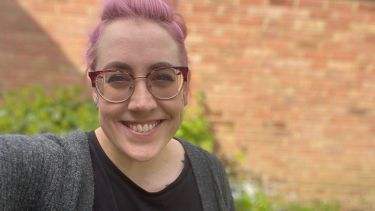The learning content on the course can be done at your own pace and this flexibility is so helpful

Is there a reason you chose to study Neuroscience and Neurodegeneration, and why did you choose Sheffield in particular?
“I’ve had a wish of pursuing dementia research for a while now, which has slowly grown over the years. My grandad had early onset Alzheimer's and was in the later stages during a time where my family were living with him and my nan.
“For my undergraduate degree, I did Music Production, and for my final year dissertation I looked at music and memories and how they could change how you perceive music. I had to learn about psychological principles and the emotional and memory systems of the brain which was so fascinating. My supervisor mentioned applications in the field of dementia which prompted me to explore more about the disease, once again remembering things my grandad did and how this corresponded to the symptoms of dementia. This was about 15 years ago, and as time went on, I became more invested in learning about Alzheimer's and dementia, and wanting to change the outcome for future patients.
“Eventually in 2017, the government announced masters funding so I did a MSc in Psychology. I then got sponsored to complete this MSc in Neuroscience and Neurodegeneration so I can pursue the neuroscience side of dementia research, and achieve my goal of getting a PhD and becoming a dementia scientist. Sheffield stood out to me in particular because not only are they a Russell Group university but their research has always been regarded as world-leading.”
What did you enjoy most about the course?
“The thing I enjoyed most about the course was the variety of modules being taught. We went from basic neuroanatomy, to genetics, to biochemistry, and then looked in depth at the mechanisms behind the most prevalent neurodegenerative diseases. It was very extensive and gave me a firm grounding in all the different aspects of these diseases - from their causes and treatments to how clinical research is carried out.”
What knowledge and skills did you develop during your course?
“During the course, I developed such a wide range of skills, including critical thinking and how to analyse sources and other research. Assignments throughout the course helped me to hone my essay writing and presentation skills and the research module in the final year hugely increased my research skills too.
“My time-management has definitely improved too, having to juggle the coursework alongside my part-time job which I know will be immensely helpful in the future as I have to be incredibly organised.”
How did the part-time distance learning aspect of the course help you to work and study?
“I could not have afforded to attend a full time masters programme, therefore part-time distance learning enabled me to study while still working to support myself.
“The learning content on the course can be done at your own pace and this flexibility is so helpful considering I often had to work evenings; I could fit a lecture into my lunch break or even at the weekend if I needed to.
There is an understanding that most people completing this distance learning course have work or family commitments and so any live tutorials are recorded for everyone to view when they can. The academic staff are so helpful too, taking everyone’s work hours and time zones into account when organising meetings.
Katie Raine
Tell us how you imagine the masters course will inform your future career plans?
"I always knew that I would need to complete a PhD to become a dementia scientist and that I wanted to go down the neuroscience route. While I have a masters in Psychology, I knew that I needed to gain some knowledge in neuroscience in order to apply for and complete a PhD project in the areas I’m particularly interested in. This course has opened so many more career directions for me in these areas and I cannot wait to get started.”
What would you say to a student thinking about studying the Neuroscience and Neurodegeneration course at Sheffield?
“For anyone else thinking about taking this course I would urge them to do it, as it has been such a great experience! It's tailored specifically for individuals who may not have a lot of knowledge in areas of neuroscience, and you are taught all the fundamentals so that you can easily understand the more advanced content later on. The lecturers are incredibly knowledgeable and are so helpful if you have any questions along the way.”

